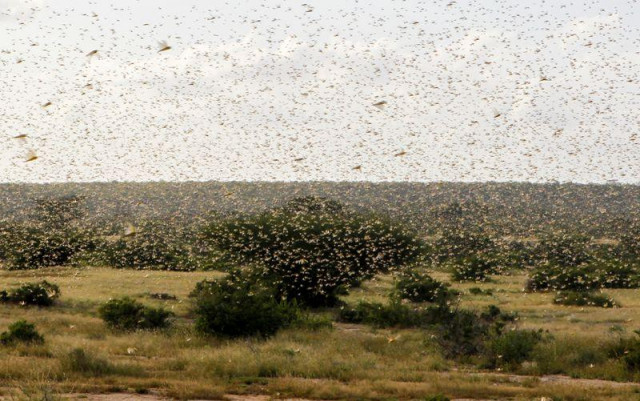No locust presence in Balochistan, Punjab, K-P
NLCC says hopper breeding in Tharparkar and parts of Cholistan

The National Locusts Control Centre (NLCC) said on Thursday there was no locust in Punjab, Balochistan and Khyber Pakhtunkhwa as of now, but the hopper was still present and actively breeding in Tharparkar in Sindh and some parts of Cholistan desert.
On Thursday, the NLCC said in a statement, locust was found only in two districts of Sindh, Tharparkar and Karachi. The population developing in Nangarparkar, in the Thar district of Sindh, is likely to fledge by mid-August, it added.
“As for Thursday no locust is present in Punjab, Balochistan & Khyber Pakhtunkhwa. Active breeding is taking place in Tharparkar and some areas of Cholistan,” the statement said. “Locust is found only in two districts/areas, including Tharparkar and Karachi.”
The NLCC, which serves as the nerve centre of the government’s gigantic efforts against locust attack, said that anti-locust survey and control operations were in progress. In the last 24 hours, the survey of more than 265,000 hectares was completed, it added.
According to the NLCC, 4,703.25 square kilometres had been treated in Balochistan, with the help of 232 teams, 112 vehicles and 1,288 manpower. In Punjab, 4,589.60 square kilometres had been treated with the help of 539 teams,388 vehicles and 2,830 manpower and in Khyber Pukhtunkhwa 625.35 square kilometres had been treated with the help of 80 teams, 106 vehicles, and 847 manpower.
In Sindh, the NLCC statement said, 1,016.2 square kilometres had been treated with the help of 242 teams, 174 vehicles and 1,177 manpower. It added that the Department of Plant Protection (DPP) was using four Beaver aircraft from Sukkur, Tharparkar, Lahore, Islamkot and Karachi for aerial sprays.
In the last six months, anti-locust operations were carried out in more than 1.1 million hectares. A successful aerial spray operation had been carried out in Islamkot area to eradicate the locust swarms. The 400-hectare main aerial spray eliminated 80% of the locusts in Tharparkar region.



















COMMENTS
Comments are moderated and generally will be posted if they are on-topic and not abusive.
For more information, please see our Comments FAQ